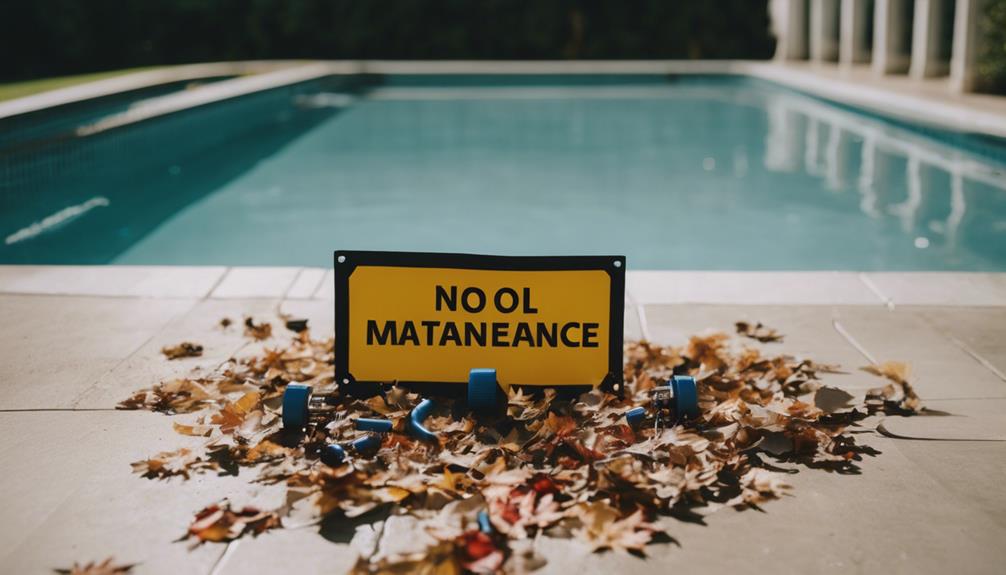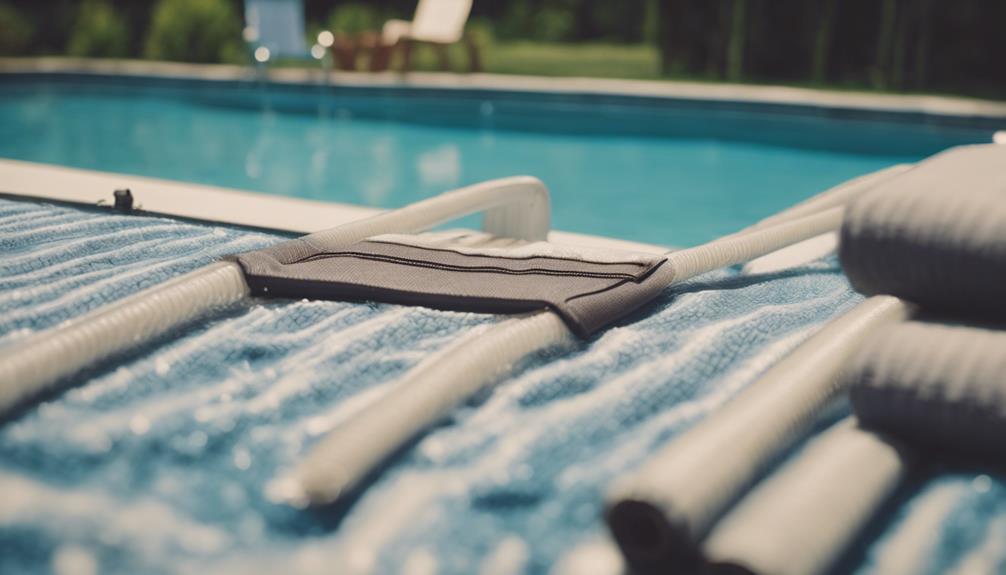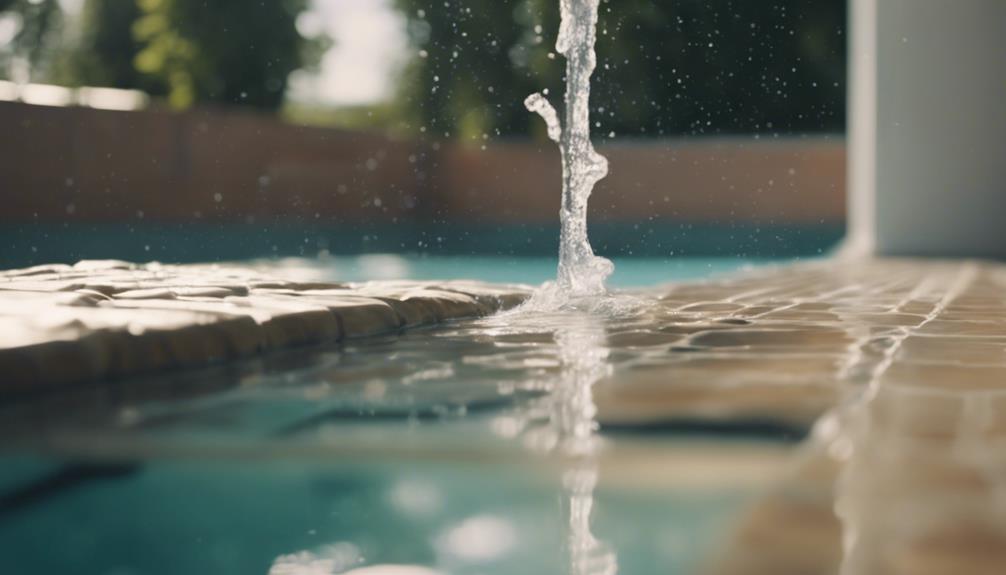Uncommon sounds, continual leaks, or age-related problems suggest it may be time to substitute your pool pump. Peculiar noises frequently indicate issues with water level or the filter. Leaks that persist can result in expensive fixes if not dealt with promptly. Older pumps may exhibit signs such as delayed startup or motors overheating. Overlooking regular upkeep can lead to blocked filters and ineffective pump operation. Substituting the pump guarantees improved water circulation and filtration, averting unforeseen malfunctions. Upgrading can reduce energy expenses and enhance overall pool performance. Delve deeper to grasp the significance of timely pump replacement.
Key Takeaways
- Unusual noises or persistent leaks indicate pump issues.
- Age-related problems like motor overheating signal pump failure.
- Neglecting daily maintenance leads to costly repairs.
- Pump replacement ensures better circulation and energy efficiency.
- Consulting experts helps choose the right pump for your pool.
Unusual Noises From Your Pump
When strange noises emanate from your pool pump, it could indicate underlying water level issues or filter malfunctions that require immediate attention. Low water levels can stress the pump, leading to unusual sounds.
Additionally, air entering the system due to filter problems can cause vibrations and further noise disturbances. Identifying the source of these noises is essential for proper troubleshooting.
If left unaddressed, these issues could potentially worsen and result in more significant damage to your pool pump system. Seeking advice from a pool expert is recommended to accurately diagnose and resolve the problem efficiently.
Pump Leaks That Persist
Persistent pump leaks, whether air or water, can indicate underlying issues that require immediate attention to prevent further harm to your pool system.
Air leaks, typically caused by loose pump lids, can be resolved by ensuring proper sealing.
On the other hand, water leaks such as side suction or shaft seal leaks demand timely professional intervention to prevent extensive harm like cloudy water or water loss.
Addressing pump leaks promptly is important as they can lead to expensive repairs if left unchecked.
Regularly checking for and addressing any leaks in your pool pump is essential for maintaining best performance and prolonging the lifespan of your pool system.
Age-Related Pump Issues

Regularly monitoring the age of your pool pump is essential to identify signs of deterioration and potential issues. As pool pumps typically have a lifespan of up to 12 years, it is pivotal to be aware of age-related pump problems. Signs of pump failure due to old age include lagging startup, overheating motors, and defective bearings. Expert diagnosis is necessary to determine if a new pump is required to prevent pool malfunctions and maintain proper water circulation. Ensuring regular maintenance can help extend the life of your pool pump. Below is a table illustrating key age-related pump issues:
| Age-Related Pump Issues | Symptoms | Action Needed |
|---|---|---|
| Lagging Startup | Pump takes longer to start | Expert diagnosis |
| Overheating Motor | Excessive heat from motor | Consider replacement |
| Defective Bearings | Unusual sounds or vibrations | Professional repair |
Neglecting Daily Maintenance
Consistent neglect of daily pool maintenance can lead to costly repairs and prolonged downtime. Failing to perform routine tasks such as skimming debris, checking water chemistry, and inspecting the pump can result in various issues.
Clogged filters, algae growth, and pump inefficiency are common consequences of neglecting daily maintenance. These problems can escalate, causing equipment breakdowns and water quality issues. Regular maintenance tasks are essential for ensuring proper water flow, sanitation, and pump longevity.
Trusting professional pool maintenance services can help prevent costly repairs and minimize downtime. By staying proactive with daily maintenance, pool owners can enjoy a well-functioning pool while avoiding unnecessary expenses and disruptions.
Importance of Pump Replacement

Neglecting daily maintenance tasks can lead to costly repairs and breakdowns in pool equipment; understanding the importance of pump replacement is essential for maintaining water quality and prolonging the longevity of your pool system.
When it comes to pool pump replacement, there are key factors to ponder:
- Water Quality: A new pump guarantees better water circulation and filtration, leading to cleaner and safer swimming conditions.
- Preventing Malfunctions: Regular pump replacement prevents unexpected breakdowns that can disrupt your pool activities.
- Energy Efficiency: Upgrading to a new pump can save on energy costs and improve overall performance.
- Professional Guidance: Consulting with experts helps in selecting the right pump size and type for your specific pool needs.
Frequently Asked Questions
How Can I Differentiate Between Normal Pump Sounds and Unusual Noises?
Differentiating between normal pump sounds and unusual noises is essential for pool maintenance. Unusual sounds like vibrations or grinding may indicate issues with water levels or filters. Seeking advice from pool experts helps troubleshoot effectively.
What Are the Potential Consequences of Ignoring Persistent Pump Leaks?
Persistently ignoring pump leaks is akin to turning a blind eye to a leaking ship; it invites disaster. Water loss, cloudy pools, and potential damage necessitate swift professional intervention to avert costly repairs and safeguard pool integrity.
Is There a Way to Prolong the Lifespan of an Aging Pool Pump?
To extend the lifespan of an aging pool pump, prioritize regular maintenance, including cleaning filters, checking for leaks, and ensuring proper water levels. Timely repairs and expert assessment can address issues before they escalate, maximizing pump longevity.
What Are the Risks of Neglecting Daily Pool Maintenance Tasks?
Neglecting daily pool maintenance tasks poses risks of water contamination, equipment damage, and costly repairs. Regular upkeep is essential to preserve water quality, prevent malfunctions, and guarantee a safe swimming environment. Trust professional guidance for best pool care.
How Do I Determine the Right Time to Replace My Pool Pump for Optimal Performance?
Determining the best time for pool pump replacement involves evaluating factors like age, performance issues, and energy efficiency. Professional evaluation guarantees proper sizing and type selection, enhancing water quality, preventing malfunctions, and improving system longevity.
Conclusion
To sum up, identifying the signs indicating the necessity for pool pump replacement is vital for maintaining a well-functioning pool system.
Just like a car engine requires regular upkeep to operate at its best, a pool pump must be replaced when it displays signs of wear and tear.
By addressing issues such as uncommon sounds, consistent leaks, and age-related performance issues promptly, pool owners can guarantee effective water circulation and sanitation for their pool.










